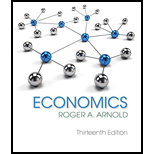
The relationship between Mexican demand for U.S. goods and supply of pesos and explain relation between U.S. demand for Mexican goods and supply of dollars.
Explanation of Solution
Suppose a person, who is in Mexico needs to buy the product of U.S. but the Mexican has pesos, whereas the Americans have to be paid in terms of dollar. Hence, the person in Mexico needs to exchange the pesos with dollars.
As demand for U.S goods increases, demand for dollar also increases in order to buy the U.S. goods. The supply of pesos increases as there is an increase in the demand for dollar. Likewise, as demand for Mexican goods increases, the demand for pesos also increases in order to buy Mexican goods. Demand for pesos increases with increase in the supply of dollars.
Want to see more full solutions like this?
Chapter 34 Solutions
Economics (MindTap Course List)
- Not use ai pleasearrow_forwardNot use ai pleasearrow_forwardThe Firm's Output Decision (Study Plan 12.2) Use the following table to work Problems 4 to 6. Pat's Pizza Kitchen is a price taker. Its costs are Output (pizzas per hour) Total cost (dollars per hour) 0 10 1 21 2 30 3 41 4 54 5 69 4. Calculate Pat's profit-maximizing output and economic profit if the market price is (i) $14 a pizza. (ii) $12 a pizza. (iii) $10 a pizza. 5. What is Pat's shutdown point and what is Pat's economic profit if it shuts down temporarily? 6. Derive Pat's supply curve.arrow_forward
- Use the following table to work Problems 27 and 28. ProPainters hires students at $250 a week to paint houses. It leases equipment at $500 a week. The table sets out its total product schedule. Labor (students) 1 Output (houses painted per week) 2 23 5 3 9 4 12 5 14 6 15 27. If ProPainters paints 12 houses a week, calculate its total cost, average total cost, and marginal cost. At what output is average total cost a minimum? 28. Explain why the gap between ProPainters' total cost and total variable cost is the same no matter how many houses are painted.arrow_forwardUse the following table to work Problems 17 to 20. The table shows the production function of Jackie's Canoe Rides. Labor Output (rides per day) (workers per day) Plant 1 Plant 2 Plant 3 Plant 4 10 20 40 55 65 20 40 60 75 85 30 65 75 90 100 40 75 85 100 110 Canoes 10 20 30 40 Jackie's pays $100 a day for each canoe it rents and $50 a day for each canoe operator it hires. 19. a. On Jackie's LRAC curve, what is the average cost of producing 40, 75, and 85 rides a week? b. What is Jackie's minimum efficient scale?arrow_forwardPlease solve this questions step by step handwritten solution and do not use ai thank youarrow_forward
- 1. Riaz has a limited income and consumes only Apple and Bread. His current consumption choice is 3 apples and 5 bread. The price of apple is $3 each, and the price of bread is $2.5 each. The last apple added 5 units to Sadid's utility, while the last bread added 7 units. Is Riaz making the utility-maximizing choice? Why or why not? Do you suggest any adjustment in Riaz's consumption bundle? Why or why not? Give reasons in support of your answer. State the condition for a consumer's utility maximizing choice and illustrate graphically. 2. Consider the following table of long-run total costs for three different firms: Quantity Total Cost ($) Firm A Firm B Firm C 1 60 11 21 2 70 24 34 3 80 39 49 4 90 56 66 5 100 75 85 6 110 96 106 7 120 119 129 Does each of these firms experience economies of scale or diseconomies of scale? Explain your answer with necessary calculations.arrow_forwardRiaz has a limited income and consumes only Apple and Bread. His current consumption choice is 3 apples and 5 bread. The price of apple is $3 each, and the price of bread is $2.5 each. The last apple added 5 units to Sadid's utility, while the last bread added 7 units. Is Riaz making the utility-maximizing choice? Why or why not? Do you suggest any adjustment in Riaz's consumption bundle? Why or why not? Give reasons in support of your answer.State the condition for a consumer's utility maximizing choice and illustrate graphically.arrow_forward1. Riaz has a limited income and consumes only Apple and Bread. His current consumption choice is 3 apples and 5 bread. The price of apple is $3 each, and the price of bread is $2.5 each. The last apple added 5 units to Sadid's utility, while the last bread added 7 units. Is Riaz making the utility-maximizing choice? Why or why not? Do you suggest any adjustment in Riaz's consumption bundle? Why or why not? Give reasons in support of your answer. State the condition for a consumer's utility maximizing choice and illustrate graphically.arrow_forward
 Economics (MindTap Course List)EconomicsISBN:9781337617383Author:Roger A. ArnoldPublisher:Cengage Learning
Economics (MindTap Course List)EconomicsISBN:9781337617383Author:Roger A. ArnoldPublisher:Cengage Learning

 Brief Principles of Macroeconomics (MindTap Cours...EconomicsISBN:9781337091985Author:N. Gregory MankiwPublisher:Cengage Learning
Brief Principles of Macroeconomics (MindTap Cours...EconomicsISBN:9781337091985Author:N. Gregory MankiwPublisher:Cengage Learning
 Managerial Economics: Applications, Strategies an...EconomicsISBN:9781305506381Author:James R. McGuigan, R. Charles Moyer, Frederick H.deB. HarrisPublisher:Cengage Learning
Managerial Economics: Applications, Strategies an...EconomicsISBN:9781305506381Author:James R. McGuigan, R. Charles Moyer, Frederick H.deB. HarrisPublisher:Cengage Learning





